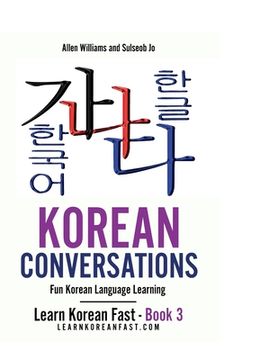Compartir
Korean Conversations Book 2: Fun Korean Language Learning (en Inglés)
Allen Williams
(Autor)
·
Sulseob Jo
(Autor)
·
Power Me Up Publishing
· Tapa Blanda
Korean Conversations Book 2: Fun Korean Language Learning (en Inglés) - Williams, Allen ; Jo, Sulseob
S/ 61,52
S/ 123,04
Ahorras: S/ 61,52
Elige la lista en la que quieres agregar tu producto o crea una nueva lista
✓ Producto agregado correctamente a la lista de deseos.
Ir a Mis Listas
Origen: Estados Unidos
(Costos de importación incluídos en el precio)
Se enviará desde nuestra bodega entre el
Lunes 24 de Junio y el
Lunes 08 de Julio.
Lo recibirás en cualquier lugar de Perú entre 2 y 5 días hábiles luego del envío.
Reseña del libro "Korean Conversations Book 2: Fun Korean Language Learning (en Inglés)"
This is Book 2 of Korean ConversationsThis book is for any level of Korean language learner who can read and pronounce Hangul. This is not a textbook in the usual sense. It is really more of a practice and example book. There are no "lessons" lain out for you. These are practice conversations for you to get exposure to the way normal, comfortable conversations occur, and while there are of course a number of ways to translate or say the same thing in any language, the examples chosen are done so in a way to narrow down those choices. Each conversation is intended to be both practical and interesting to help you to more easily remember the vocabulary. You will also see several short phrases that are repeated throughout various conversations. This will also help you through repetition to learn those phrases more easily by seeing them in context. Each conversation is between two people who presumably know each other fairly well. This is important to keep in mind for context and for the levels of politeness either used or implied.You will not find a lot of notes or explanations for several reasons. The main reasons being that by looking at the conversations and the translations you should be able to figure out on your own which parts go together, and the more of this connecting and figuring out you do on your own the easier it will be for you both to acquire the language and to remember it.This also allows you to work at this at many different levels and at the levels that suit or interest you. For example, you might see some parts as simply being useful vocabulary or expressions, while someone else might notice that the sentence structure can be used for other instances by doing simple replacing of either the noun or the verb stem. You might also find that going over the conversations and memorizing them is great for you when you are a beginner, but as you progress, revisiting the conversations and digging deeper into the sentence structures can help you to expand your ability to communicate even more.From the AuthorThis book is the followup from a much earlier book on learning hangul. We felt there are not enough resources for students of Korean language to supplement their course materials or to just add vocabulary and phrases without digging them out of large, difficult, and cumbersome textbooks.What do you need to get started with this book?You need to understand basic grammar and word order for Korean and have the ability to read the Korean alphabet. That's it. If you can read hangul, it shouldn't take you long to figure out the rest.This book is a practice alone or with a partner resource for learning Korean conversation in a fun, fast manner.It isn't lessons, and it isn't grammar. It is a collection of conversations written in a style that facilitates being translated as directly as possible so the student can more easily discern what parts of the English sentences are the corresponding words and phrases in the Korean sentences.That isn't to say it's the only way any of these sentences might be translated. It is just that the presented conversations represent as closely as possible the literal meanings and translations or the best "what would a Korean speaker use here" phrases.Figuring these things out on your own will help you to grasp the vocabulary much, much quicker than if the explanations are there in front of you and giving you the false sense that you understand and have it down.
- 0% (0)
- 0% (0)
- 0% (0)
- 0% (0)
- 0% (0)
Todos los libros de nuestro catálogo son Originales.
El libro está escrito en Inglés.
La encuadernación de esta edición es Tapa Blanda.
✓ Producto agregado correctamente al carro, Ir a Pagar.

